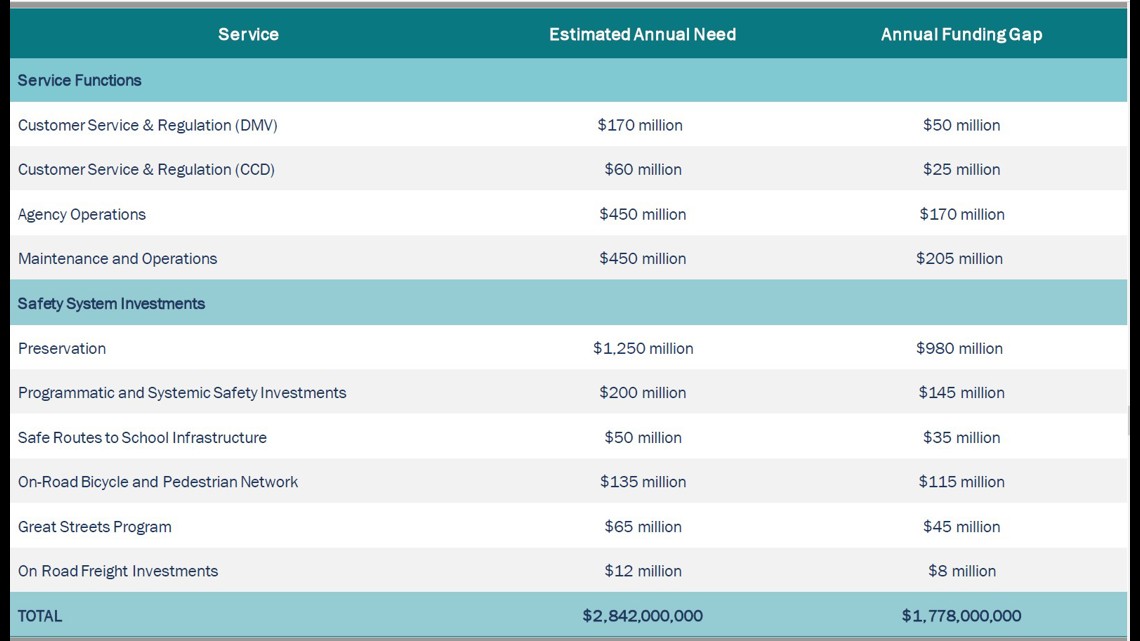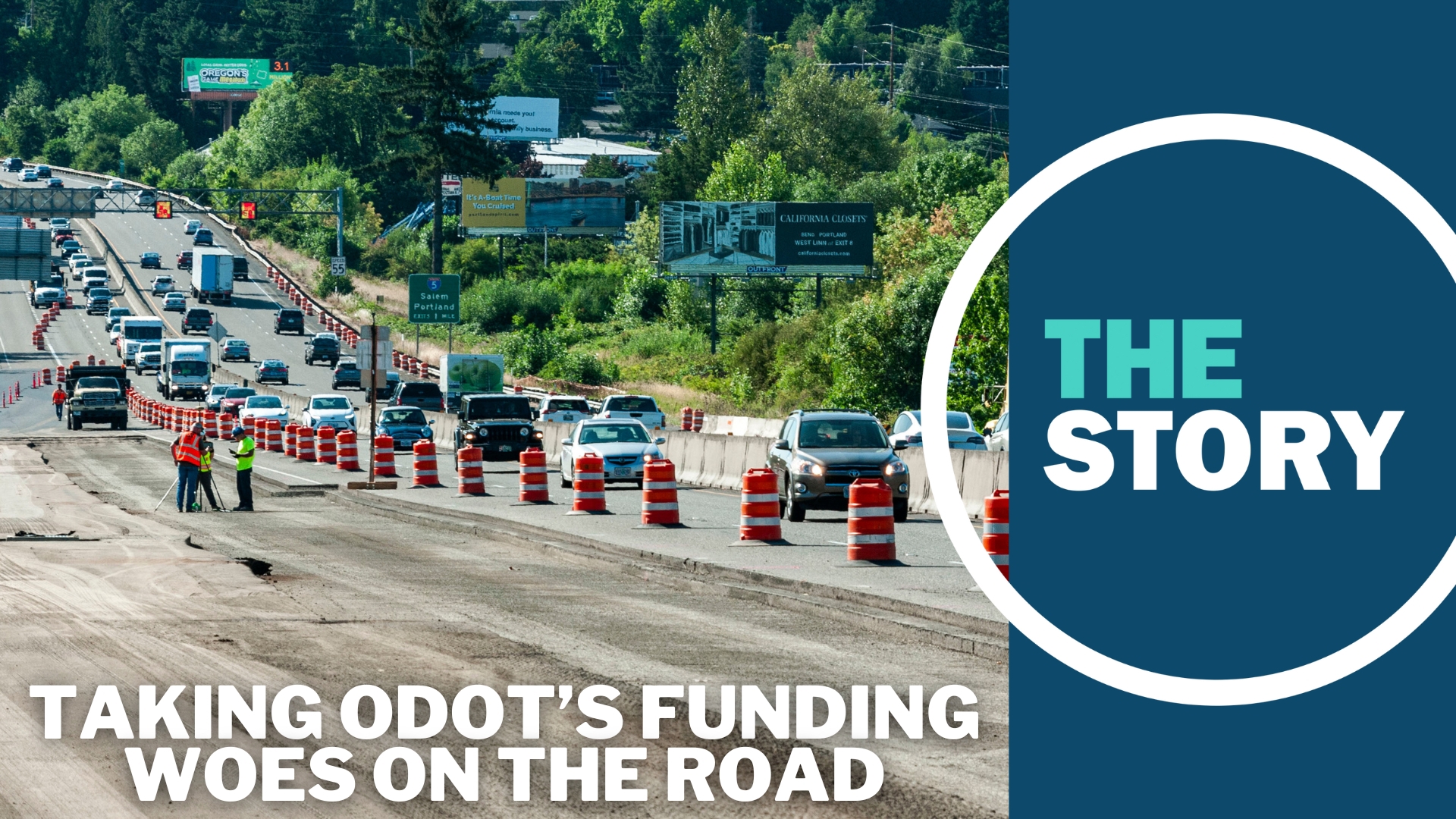PORTLAND, Ore. — On Tuesday night, Oregon lawmakers began a statewide tour intended to find out what voters and taxpayers think about the state's highways — and more importantly, how to pay for their upkeep.
The bipartisan Joint Committee on Transportation held the first of an eventual 12 statewide hearings at Portland Community College's Cascade campus on North Killingsworth Street in Portland. They invited members of the public to testify, but first they heard from Chris Strickler, director of the Oregon Department of Transportation.
Strickler has been telling anyone who will listen that the agency does not have enough money and needs help. Tolling was supposed to a shot in the arm for ODOT's improvement projects, but Gov. Tina Kotek effectively put a damper on the idea last year — and even that wouldn't help with the agency's maintenance budget.
ODOT's director displayed slides showing both lawmakers and the public where the agency's money is coming from and where it's going. According to Strickler, the agency is looking at a significant shortfall.
"The gap that we currently experience is $1.7-1.77 billion," Strickler said. "So roughly two-thirds of what we're putting in front of you is a gap. And that is a sign for where we sit in our transportation system and our ability to maintain and keep pace with the needs that Oregonians are looking for."


In a video, ODOT underlined that vehicles today, for instance a Toyota Camry, use 25% less gas than they did during the '90s. That means the state is taking in less revenue in gas taxes per vehicle.
Making matters worse, the federal gas tax has not increased in decades — and even if Oregon's gas tax has gone up, it's not pegged to inflation.
So how does the state start making up for these declining revenues? ODOT has some ideas: expanding the state's fledgling pay-per-mile road usage fee program, raising registration and other vehicle fees, having lawmakers fill the gap with funds from Oregon's general fund, hiking the state's gas tax for a temporary fix, and/or indexing any and all of those fees to inflation.
Considering that any of those options will inevitably require Oregonians to pay more somewhere, they're unlikely to be popular. But the goal of Tuesday's hearing — and future hearings that will happen across the state — is to find out which options people prefer, and which they'll be willing to live with.
Going down sideroads
Gov. Kotek has already signaled that the 2025 legislative session will be a time for lawmakers to figure out ODOT's long-term sources of funding, and this series of hearings suggests that the legislature is preparing for the conversation.
But Tuesday night was just the beginning of the tour — likely few people in attendance knew much about the agenda ahead of time. And when members of the public aired their thoughts, most were not concerned with how to help ODOT's budget.
"I just wanted to like take this opportunity tonight to advocate for the community's needs for more access to trails and off-street paths," one person testified. "We need sustainable investments in creating safe and complete off-street paths for our community members. We want to see more policy language supporting the inclusion of more bike path facilities and major capital investment project corridors."
"I would like to voice my opposition to the I-5 widening project," another person said. "I have lived in this neighborhood my entire life. And throughout my entire life, I — my family has never been able to afford a car. So even if I wanted to drive anywhere I wouldn't have the ability. I would like to voice my opposition specifically, because as a member of the African American community in Portland, given the historical context of the fact that many hundreds of African Americans have been displaced by the construction of the I-5... in essence, more freeways, no more Black people. I would also like to advocate for public transit alternatives."
Some of the testimony from the public supported widening the freeways. A frequent topic during previous hearings on tolling was the problem of large trucks hauling freight getting stuck in traffic gridlock through the Portland area.
"I've been with Old Dominion in Portland for 18-and-a-half years. During that time I've watched congestion issues in the metro area, particularly on I-205 and I-5, get worse and worse every year," one person said. "Both of these highways are key trade routes for our regional and national economy and I know that tens of millions of dollars regularly pass through these interstate routes. Unfortunately today, neither route has capacity for our trucks, let alone passenger vehicles, to travel dependably."
Other members of the public wanted to let elected leaders know that they're worried about completely different issues, like landslides.
"I'm here on behalf of 30,000 people in my community that are at risk. We live or work in North Portland, on the northern part of the peninsula in the Port of Portland-Rivergate Industrial area, and the lower-income, diverse communities of St. Johns, Cathedral Park, Portsmouth and University Park," someone testified. "When the earthquake comes, liquefaction will impact us on three sides of the peninsula. On the fourth side, the bridges over the railroad cut a 100-foot-deep ditch, bisecting the peninsula at Columbia and Lombard, which are our so-called emergency routes — those bridges will collapse."
At least some of the testimony concerned frustrations that people aren't paying their fair share to use the roads, although the concern was perhaps more about locally-maintained roads than state ones.
"One two-axle TriMet bus does as much damage to the roads as 1,200 cars," someone said. "Add the weight of batteries, and electric buses will do even more damage. TriMet fares only cover about 19% of just the operating costs. Transit riders need to help pay for the roads. Furthermore, bicycling is not sustainable until bicyclists accept some accountability and pay for bicycle infrastructure."
When public testimony was over, the lawmakers in attendance thanked everyone who came to share their concerns.

